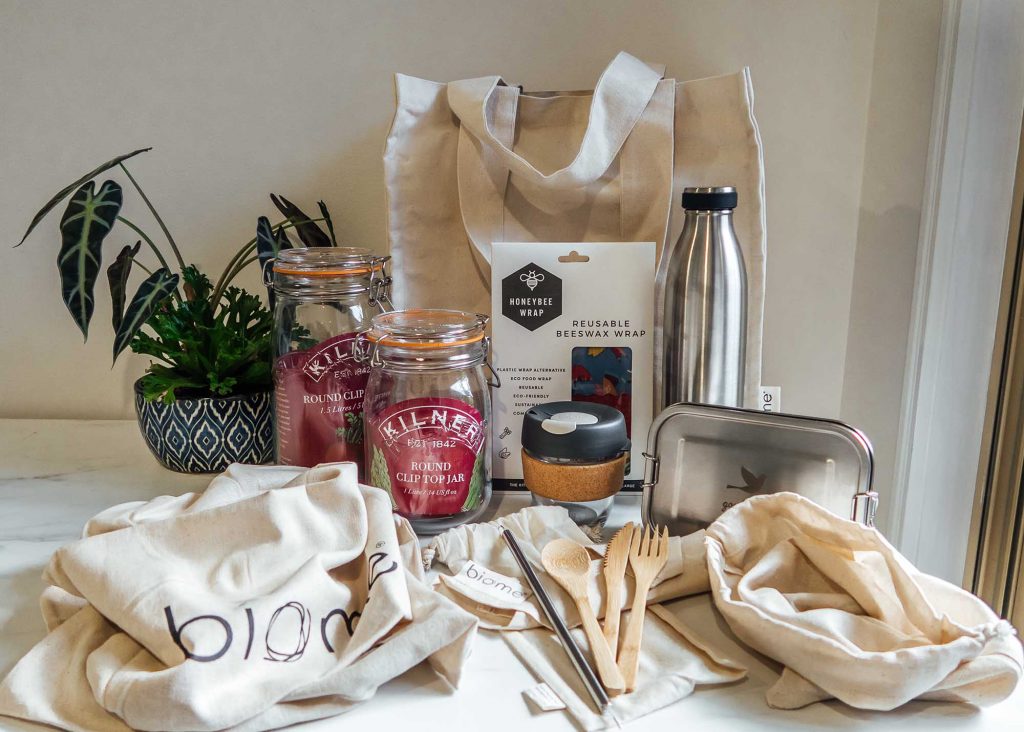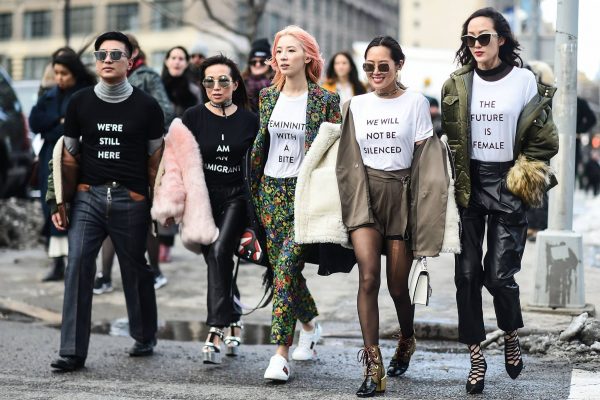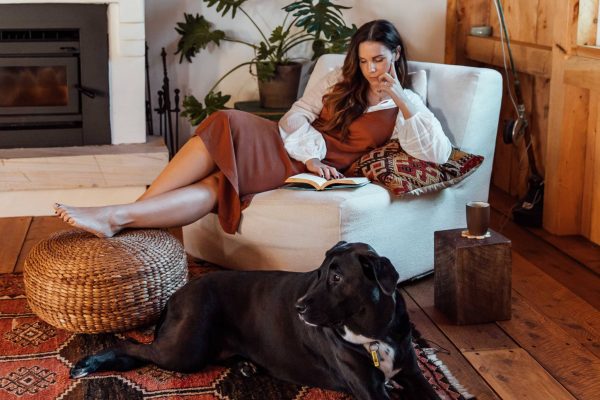Plastic pollution, you might have heard the facts.
That 95% of plastic is used just once before being discarded or how on average, Australians use 130 kg of plastic per person each year, and only 12% of that’s recycled. Or that one where by 2050, there will be more plastic in the ocean than fish. There’s also my personal not-so-favourite; a staggering eight million tonnes of the stuff enters the ocean each year and is set to double by 2025.
Single-use plastic is convenient for a few minutes.
Then hangs around for hundreds of years, ending up in landfills, parks, and streams, then makes its way into our oceans where it breaks down into microplastics, consumed by marine animals and washes up on our beaches.
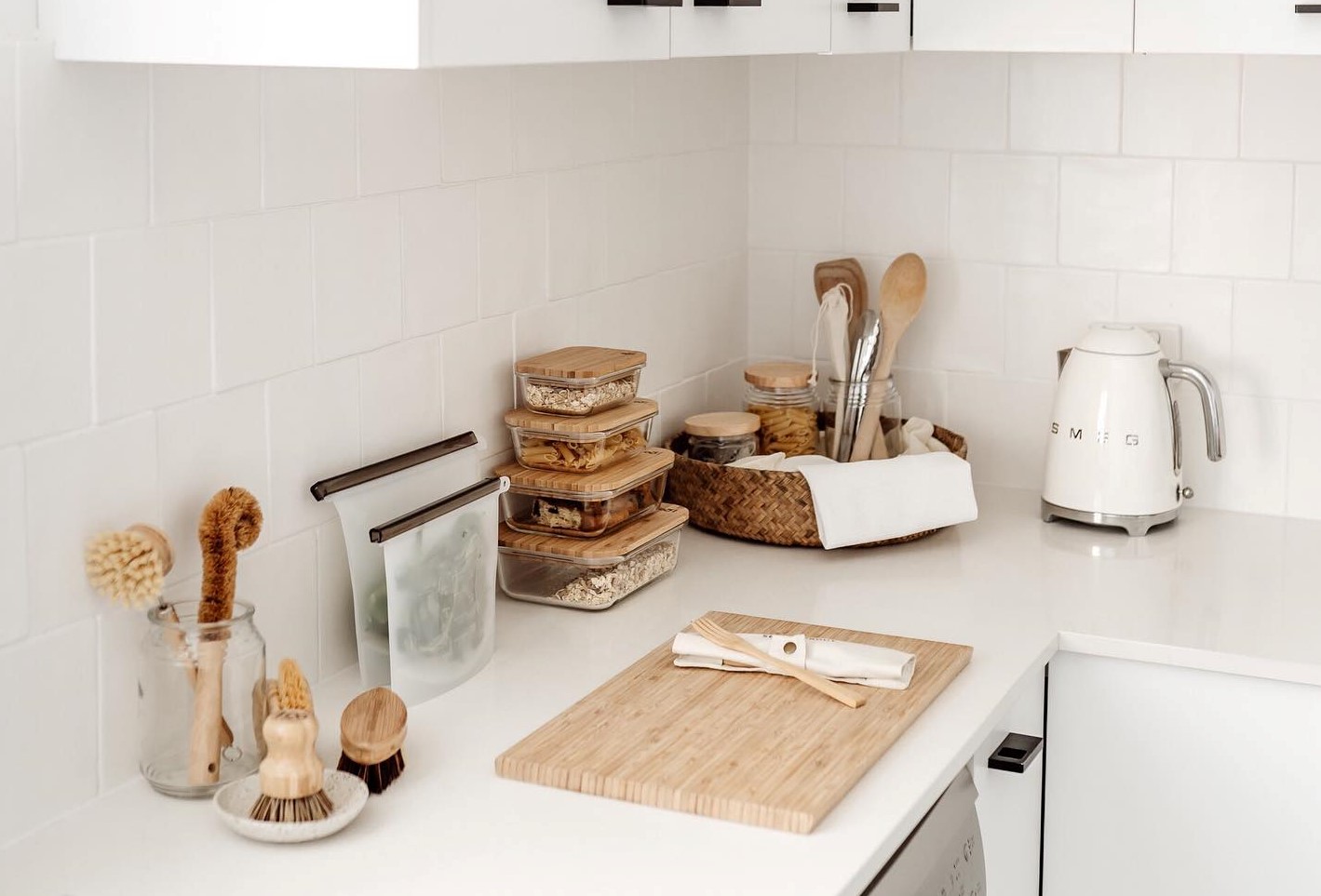
So what can we do about it?
- Refuse single-use plastics. These are things like your grocery bags, water bottles, straws, and coffee cups.
- Reuse what you have. If what you have is plastic, bags or containers, use them until you can’t anymore, then when you can invest in non-plastic reusables.
- Recycle as the last option. Packaging is everywhere and sometimes hard to avoid. So if you need to buy packaged items, look for plastic that can be recycled.
The first step is to assess what types of plastic you use day to day then work out where you can make changes. Not surprisingly, the greatest amount of waste often comes from the kitchen, so that’s a good place to start. But when you stop and look around your home, you’ll find plastic almost everywhere.
It’s the not-so-obvious things that can be hard to spot, so I’ve put together 51 plastic-free swaps to help make it easier for you.
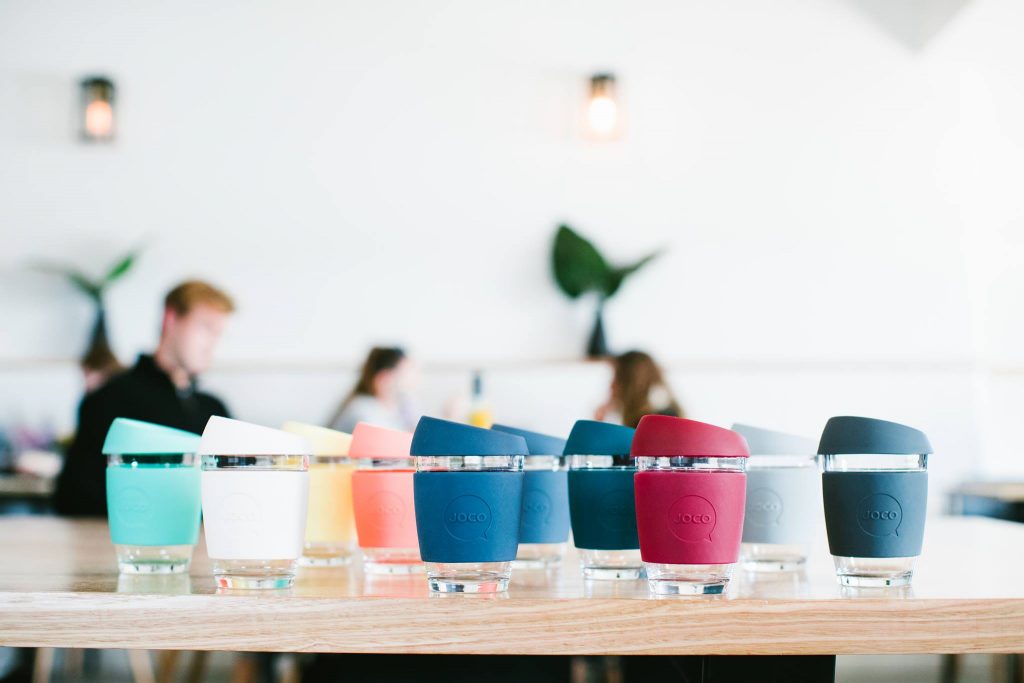
Out and about
1. Coffee Cup – The best place to start. Check out some of our favourite reusable coffee cups here.
2. Water Bottle – There are literally thousands of options out there, just choose the style that works for you and remember to take it with you.
3. Straw – Unless you need a plastic straw (and some people do) it’s time to #stopsucking and invest in a reusable stainless steel, bamboo or glass straw.
4. Takeaway Container – For those lunches out BYO container from home or get yourself a multi-purpose lunchbox or bento box.
5. Cutlery – No need for a plastic fork when you bring your own. Invest in a handy travel kit or just bring some cutlery from home.
6. Smoothie cup – Love juices and smoothies? Grab a large cup or mason jar from home or try one of these cups which also come with their own straw.
Shopping
7. Grocery bags – If you have an overflowing drawer of plastic bags at home, use those until they fall apart then get yourself a few reusable bags.
8. Produce bags – Stop using those thin plastic bags and get a set of these to hold all the loose fruit and veg. My faves are from Biome and Seed & Sprout or you can DIY at home with old clothes.
9. Containers – If you already have plastic ones like Systema or Tupperware use those, they will last a lifetime or invest in a glass or stainless set you can take with you to hold meat, deli food, or produce.
10. Market Basket – Not 100% required but I love big baskets for the markets so my food doesn’t get squashed while I walk around.
11. Bread Bag – The best thing to store your bread or you can also use a pillowcase or a cloth bag like the one’s online clothes orders now come in.
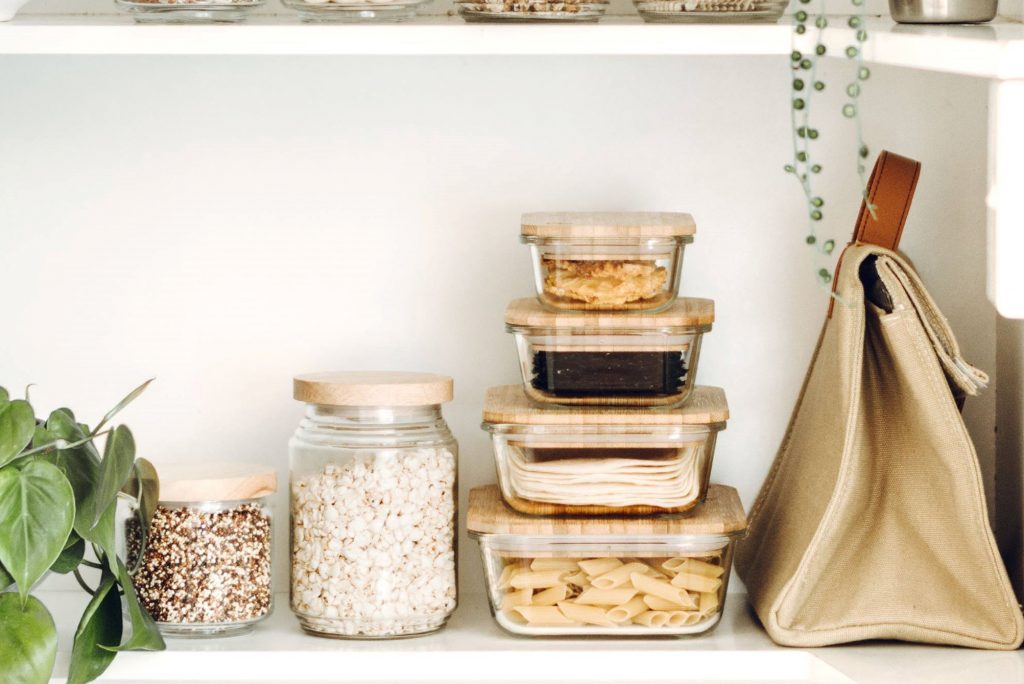
Kitchen
12. Beeswax Wraps – Say goodbye to clingwrap and try reusable beeswax wraps or vegan wraps. They keep your food fresh and are home compostable at the end of life.
13. Storage Jars – Perfect for storing all your food and keeping them airtight and fresh. You can buy them from bulk food stores or Biome. For a budget-friendly option, look for the second-hand on Gumtree or from op-shops or use old sauce, peanut butter, or any food jars you already have.
14. Produce Savers – If you like to leave your veggies in plastic produce bags to keep them fresh, swap them for reusable produce bags. They work brilliantly to keep your produce fresher for longer.
15. Coffee Pods – Compostable or refillable pods are the earth-friendly option, or if you’re an instant lover, try Sipp Instant for a cafe-style instant coffee with a compostable bag.
16. Sandwich Bag – These make great cling wrap or zip lock bag replacements for kids or your lunches.
17. Cloths and Sponges – Most clothes and sponges are designed to be thrown or fall apart after a month or so of use. The sturdier microfiber cloths aren’t good either as they shed microplastics which ends in the ocean. Instead, look for cotton or natural fiber cloths that are sturdier, made to last and can be chucked in the wash for a clean.
18. Dish Brush – Swap the plastic for bamboo and metal. The bamboo can be composted and the metal recycled. Bonus points for replacing the head a few times before the handle wears out.
19. Skewers – Use uncoated compostable bamboo or stainless steel reusable ones.
20. Lunchbox – There are so many options out there for lunchboxes try Biome, Bento Box, and pretty much any grocery store, Target, Kmart etc. For parents I have it on good authority Seed & Sprout make a great lunchbox for little ones.
21. Tea Infuser – Did you know most teabags contain plastic? Which means they’re not compostable either. Swap out the teabags for looseleaf and an infuser.
22. Teatowels – Paper towels are a huge waste; cotton tea towels clean up spills just the same and last a lot longer.
23. Ziplock Bags – Silicon pouches make a great replacement for ziplock bags, and they’ll last a lot longer. They’re also perfect for freezing food.
24. Plate Covers – You can use beeswax wraps or silicon covers which seal keeping the food fresh.
25. Dish Soap – Replace the dishwashing liquid with a bar of soap you keep on the sink used with the abovementioned dish brush Or keep your containers and refill them at bulk food stores.
26. Pots and Pans – Stainless steel or cast iron is much better for the environment and your health than plastic-coated non-stick cookware.
27. Cooking Utensils – Stainless steel all the way unless, or if like me you have old plastic ones, then use them until the end of their life or yours, whichever comes first.
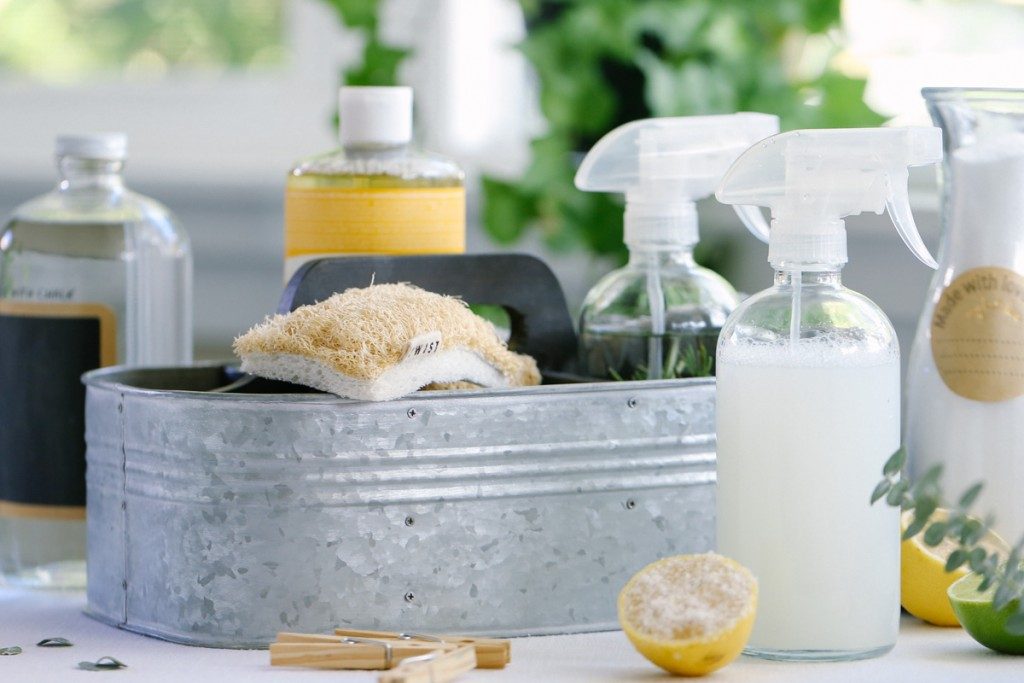
Image via Live Simply
Cleaning & Home
28. Laundry Powder and Liquid – So many great options here. Dirt Company, Biome, and Ecostore are my top picks.
29. Pegs – Opt for stainless steel to last a lifetime or bamboo, which you can compost and recycle at the end of life.
30. Jars and Spray Bottles – Happy to DIY? Invest in reusable bottles to store your cleaning products.
31. Coat Hangers – Wooden, which you can find cheaply at Bunnings and Target or stainless steel hangers make a better alternative to plastic
32. Candles – Go for a glass jar you can reuse or refill.
33. Toilet Brush – Stainless steel or wooden with natural bristle brushes.
34, Postage bags – Swap plastic satchels for compostable ones. Bonus points if you use a compostable label as well.
35. Garbage bags – This is a tricky one because there’s a lot of greenwashing marketing out there. Any product that says it’s biodegradable or compostable means it can be composted in a commercial-grade bin. Look for plant-based options like cornstarch as an alternative to plastic. Not a perfect solution but the best available for now.
36. Dog poop bags – As above, if you’re out and about, use bio-bags for picking up waste. For home bypass the bags altogether and chuck the poop straight into a dog poop composter.
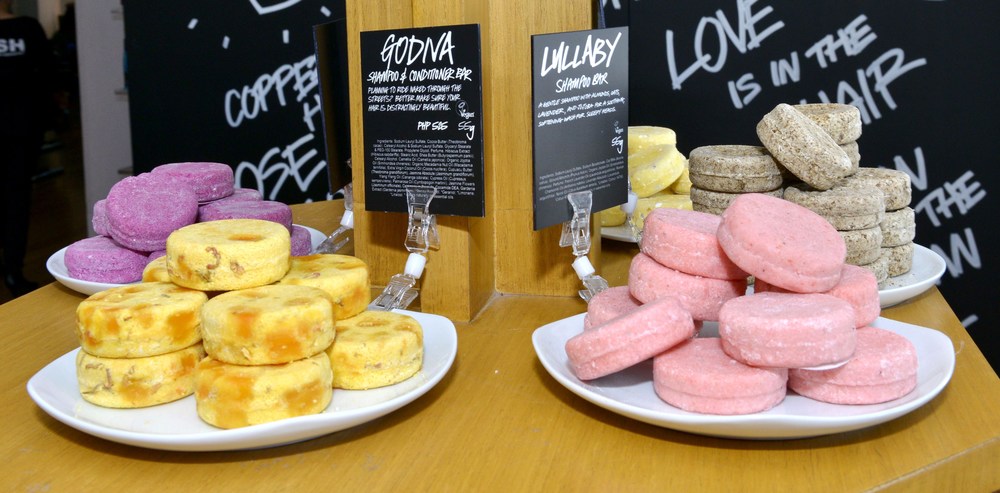
Personal Care
37. Toilet Paper – Who Gives a Crap all the way – no plastic and the packaging say ‘you have a nice bum’ what’s not to love?
38. Shampoo and Conditioning Bars – Lot’s of options out there, it just comes down to finding what works for you. I’ll give Ethique a shoutout because they have trial size packs so you don’t have to invest a lot of money or waste product to test them.
39. Solid Soap – Because at the end of the day, the body washes in plastic bottles is just a bar of soap with water added to it. Hit up any farmers market to find some beautiful natural, handmade soaps. I’m a fan of MooGoo’s and Ethique’s bars.
40. Reusable Razor – Swap out your plastic disposable razor for one you’ll have forever.
41. Bamboo Toothbrush – There are too many plastic toothbrushes floating in the ocean. Switch to a bamboo compostable one.
42. Toothpaste – Check with your dentist first but if you are happy to go down the natural road, you can make your own or try a plastic-free powder.
43. Deodorant – There’a quite a few choices and really comes down to personal preference and efficacy. Both Dave and I swear by this one by Bee Fresh and I also like Good & Clean. Check out Ethically Kate’s deodorant trial for a few more options.
44. Makeup Wipes – I love a good makeup wipe to remove my makeup on nights when I’m feeling lazy but they are so bad for the environment. Use a facecloth or a reusable round pad with micellar water.
45. Hairbrush – Swap plastic for bamboo your hair and the planet will thank you.
46. Menstrual Underwear – My preferred sustainable period solution. Between Thinx and Modibodi, we’re spoilt for choice with both brands offering a wide selection to suit different flow days and body types.
47. Washable Sanitary Pads – An alternate to reusable underwear. Hannahpad is one of the most popular brands they also have travel bags to store them.
48. Menstrual Cup – Another great sustainable menstruation option. Lot’s of styles available, this is a great video showing how to use them.
49. Hankies – Why cut down trees for your snotty nose? Use a hanky like our grandparents did.
50. Cotton Buds – I love these for cleaning up my makeup so I buy the compostable bamboo ones.
51. Makeup and skincare – check out our plastic-free beauty post here + Biome’s Naked Beauty Bar and Zero Waste Beauty range.
